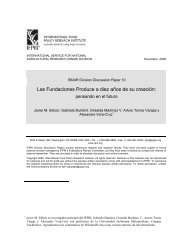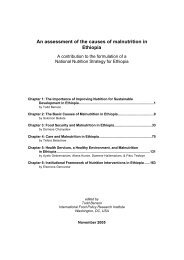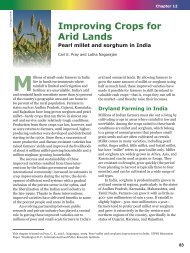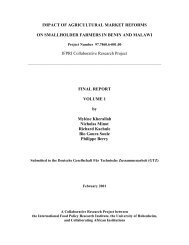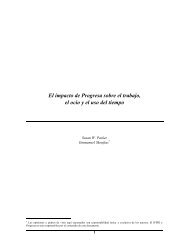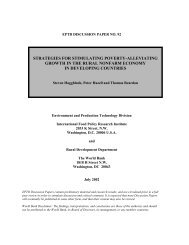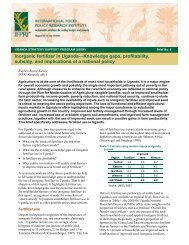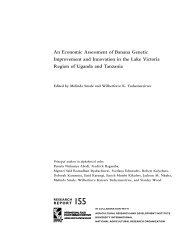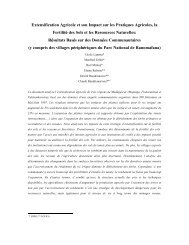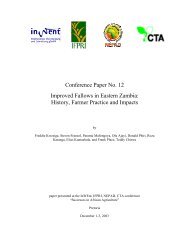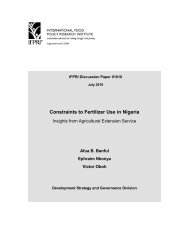The Case of Tomato in Ghana - International Food Policy Research ...
The Case of Tomato in Ghana - International Food Policy Research ...
The Case of Tomato in Ghana - International Food Policy Research ...
You also want an ePaper? Increase the reach of your titles
YUMPU automatically turns print PDFs into web optimized ePapers that Google loves.
‐‐‐‐‐<br />
GSSP Work<strong>in</strong>g Paper # 22<br />
<strong>The</strong> <strong>Case</strong> <strong>of</strong> <strong>Tomato</strong> <strong>in</strong> <strong>Ghana</strong>: Institutional Support<br />
Elizabeth J.Z. Rob<strong>in</strong>son and Shashi L. Kolavalli<br />
Development and Strategy Governance Division, IFPRI, <strong>Ghana</strong><br />
<strong>Ghana</strong> Strategy Support Program (GSSP)<br />
GSSP Work<strong>in</strong>g Paper No. 22<br />
April 23, 2010<br />
IFPRI – ACCRA<br />
IFPRI HEADQUARTERS<br />
<strong>Ghana</strong> Strategy Support Program<br />
<strong>International</strong> <strong>Food</strong> <strong>Policy</strong> <strong>Research</strong> Institute<br />
Postal Address:<br />
2033 K Street NW<br />
c/o <strong>International</strong> Water Management Institute (IWMI)<br />
Wash<strong>in</strong>gton, DC 20006-1002 USA<br />
PMB CT 112, Cantonments, Accra, <strong>Ghana</strong> Tel. +1-202-862-5600<br />
Local Address: Fax +1-202-467-4439<br />
CSIR Campus (Opposite Ch<strong>in</strong>ese Embassy)<br />
E-mail ifpri@cgiar.org<br />
Airport Residential Area<br />
www.ifpri.org<br />
Tel: +233-(0)21-780716<br />
Fax: +233-(0)21-784752<br />
http://www.ifpri.org/themes/gssp/gssp.htm<br />
For further <strong>in</strong>formation:<br />
Shashi Kolavalli, Senior <strong>Research</strong> Fellow and Program Leader<br />
s.kolavalli@cgiar.org
THE GHANA STRATEGY SUPPORT PROGRAM (GSSP)<br />
WORKING PAPERS<br />
ABOUT GSSP<br />
IFPRI’s <strong>Ghana</strong> Strategy Support Program (GSSP) was launched <strong>in</strong> 2005 to address specific<br />
knowledge gaps concern<strong>in</strong>g agricultural and rural development strategy implementation, to<br />
improve the data and knowledge base for applied policy analysis, and to strengthen the national<br />
capacity for practical applied policy research. <strong>The</strong> primary objective <strong>of</strong> the <strong>Ghana</strong> Strategy<br />
Support Program is to build the capabilities <strong>of</strong> researchers, adm<strong>in</strong>istrators, policymakers, and<br />
members <strong>of</strong> civil society <strong>in</strong> <strong>Ghana</strong> to develop and implement agricultural and rural development<br />
strategies. Through collaborative research, communication, and capacity-strengthen<strong>in</strong>g<br />
activities and with core fund<strong>in</strong>g from the U.S. Agency for <strong>International</strong> Development/<strong>Ghana</strong><br />
(USAID), GSSP works with its stakeholders to generate <strong>in</strong>formation, improve dialogue, and<br />
sharpen decisionmak<strong>in</strong>g processes around the formulation and implementation <strong>of</strong> development<br />
strategies.<br />
ABOUT THESE WORKING PAPERS<br />
<strong>The</strong> Nigeria Strategy Support Program (USSP) Work<strong>in</strong>g Papers conta<strong>in</strong> prelim<strong>in</strong>ary material and research<br />
results from IFPRI and/or its partners <strong>in</strong> Nigeria and have not been peer reviewed. <strong>The</strong>y are circulated <strong>in</strong><br />
order to stimulate discussion and critical comment. <strong>The</strong> op<strong>in</strong>ions are those <strong>of</strong> the authors and do not<br />
necessarily reflect those <strong>of</strong> their home <strong>in</strong>stitutions or support<strong>in</strong>g organizations<br />
ii
<strong>The</strong> <strong>Case</strong> <strong>of</strong> <strong>Tomato</strong> <strong>in</strong> <strong>Ghana</strong>: Institutional Support<br />
Elizabeth J.Z. Rob<strong>in</strong>son and Shashi L. Kolavalli<br />
Development and Strategy Governance Division, IFPRI, <strong>Ghana</strong><br />
iii
Introduction<br />
<strong>Ghana</strong>’s commitment to the tomato sector has its roots <strong>in</strong> the 1960s when three large tomato<br />
process<strong>in</strong>g plants were established <strong>in</strong> the country. Though set up as part <strong>of</strong> President<br />
Nkrumah’s development plan for <strong>Ghana</strong>, the current rationale for these processors typically is<br />
that they could be a solution to the perennial “gluts” <strong>in</strong> the tomato sector. And <strong>in</strong>deed process<strong>in</strong>g<br />
to reduce gluts rema<strong>in</strong>s a popular refra<strong>in</strong> <strong>in</strong> the media and <strong>in</strong> government pronouncements.<br />
However, s<strong>in</strong>ce they were opened, the processors have run considerably under capacity, if at<br />
all. Over the past two decades process<strong>in</strong>g has all but stopped; yields and production <strong>of</strong> fresh<br />
tomato <strong>in</strong> <strong>Ghana</strong> have stagnated and possibly fallen; while <strong>in</strong> parallel, imports <strong>of</strong> fresh tomato<br />
from Burk<strong>in</strong>a Faso and tomato paste from the EU and Ch<strong>in</strong>a have <strong>in</strong>creased dramatically. <strong>The</strong>re<br />
are limited time-series or recent data on yields, areas, or overall production <strong>of</strong> tomato. Data<br />
collection at the national level for tomato and other vegetables by SRID/MoFA stopped at the<br />
end <strong>of</strong> the 1980s, reflect<strong>in</strong>g a lower commitment to vegetables than the ma<strong>in</strong> food security<br />
staples. Good research <strong>in</strong>to the tomato sector has been funded and undertaken, but <strong>in</strong> isolation<br />
<strong>of</strong> any commitment to follow through with project recommendations. Aga<strong>in</strong>st this backdrop, we<br />
consider the role <strong>of</strong> various <strong>in</strong>stitutions <strong>in</strong> agriculture, and specifically <strong>in</strong> <strong>Ghana</strong>’s tomato sector.<br />
<strong>The</strong> role <strong>of</strong> the state <strong>in</strong> the agricultural sector<br />
<strong>The</strong>re is some consensus that the role <strong>of</strong> the state <strong>in</strong> agriculture should be one <strong>of</strong> policy mak<strong>in</strong>g<br />
and regulation, to correct for market failure and distributional issues (IAASTD SSA Chapter 5).<br />
Gabre-Madh<strong>in</strong> and Haggblade (2001) stress the importance <strong>of</strong> develop<strong>in</strong>g key agricultural<br />
support <strong>in</strong>stitutions, whilst Faaland and Park<strong>in</strong>son (1991) state that “it is undesirable for the<br />
state to <strong>in</strong>volve itself directly <strong>in</strong> agricultural production unless it is very sure that it has the<br />
capacity to make its entrepreneurial activities a success.” And that “<strong>in</strong>stead, the state should<br />
attempt to provide the social environment and <strong>in</strong>frastructure that are conducive to agricultural<br />
development.”<br />
More specifically, Wigg<strong>in</strong>s (1995) suggests a number <strong>of</strong> actions for African governments to<br />
improve their agricultural sectors that <strong>in</strong>clude emphasiz<strong>in</strong>g the free<strong>in</strong>g up <strong>of</strong> bottlenecks <strong>in</strong> <strong>in</strong>put<br />
and market<strong>in</strong>g channels as a substitute for more tricky market liberalization; <strong>in</strong>vest<strong>in</strong>g <strong>in</strong> rural<br />
<strong>in</strong>frastructure; and facilitat<strong>in</strong>g agricultural <strong>in</strong>tensification <strong>in</strong>clud<strong>in</strong>g <strong>of</strong>fer<strong>in</strong>g farmers a menu <strong>of</strong><br />
technical options supported by research and development. ODI emphasizes the importance <strong>of</strong><br />
def<strong>in</strong><strong>in</strong>g the boundary between public and private roles for agriculture, and understand<strong>in</strong>g the<br />
role <strong>of</strong> agriculture <strong>in</strong> the specific country. Specific activities stressed as important for m<strong>in</strong>istries<br />
<strong>of</strong> agriculture <strong>in</strong>clude focus<strong>in</strong>g on competitiveness <strong>of</strong> the sector, <strong>in</strong>clud<strong>in</strong>g the ability to compete<br />
with imports, and emphasiz<strong>in</strong>g the development <strong>of</strong> supply cha<strong>in</strong>s.<br />
<strong>Ghana</strong>’s direct public sector efforts to support and improve the tomato sector have very much<br />
focused on value-addition and large-scale process<strong>in</strong>g <strong>in</strong> particular. With the exception <strong>of</strong><br />
<strong>in</strong>vestments <strong>in</strong> irrigation, particularly <strong>in</strong> the northern regions, that benefit agriculture <strong>in</strong> general,<br />
there has been much less focus on tomato production and productivity, and no susta<strong>in</strong>ed effort<br />
to ensure viable and competitive tomato production to provide the <strong>in</strong>put required at a<br />
competitive price by the tomato processors. As a consequence, despite significant <strong>in</strong>vestments<br />
by successive governments <strong>in</strong> large-scale process<strong>in</strong>g, <strong>Ghana</strong>’s farmers have not been able to<br />
produce tomato at sufficiently high levels <strong>of</strong> output, at sufficiently low cost, and at sufficiently<br />
high quality, to enable domestic process<strong>in</strong>g to be competitive with imported tomato paste.<br />
1
Specific <strong>in</strong>terventions <strong>in</strong> the sector began with the establishment <strong>of</strong> tomato<br />
process<strong>in</strong>g plants soon after <strong>in</strong>dependence<br />
In the 1960s, as part <strong>of</strong> President Nkrumah’s government’s overall development plan for <strong>Ghana</strong><br />
(Ablorh-Odjidia 2003), three state run agro-process<strong>in</strong>g enterprises were set up: the GIHOC<br />
cannery at Nsawam (Eastern region), Pwalugu <strong>Tomato</strong> Factory at Pwalugu (Upper East region)<br />
and the GIHOC <strong>Tomato</strong> Cannery -TOMACAN <strong>of</strong> Wenchi (Brong Ahafo region). By the late<br />
1980s, a comb<strong>in</strong>ation <strong>of</strong> structural reforms promoted by the World Bank and IMF; frequent<br />
breakdowns result<strong>in</strong>g from a lack <strong>of</strong> spare parts and obsolete mach<strong>in</strong>ery; lack <strong>of</strong> technical<br />
competence and f<strong>in</strong>ancial management; and poor market<strong>in</strong>g, resulted <strong>in</strong> the closure <strong>of</strong> these<br />
three factories. S<strong>in</strong>ce the 1980s the government has made several efforts to re-start large-scale<br />
domestic tomato process<strong>in</strong>g, through its attempts to revive the Wenchi processor through a<br />
public-private partnership (PPP) and its most recent efforts to re-open the Pwalugu (Northern<br />
Star) processor <strong>in</strong> the Upper East region.<br />
PPP at Wenchi, Brong Ahafo<br />
By the late 1980s, TOMACAN <strong>of</strong> Wenchi – orig<strong>in</strong>ally called the GIHOC <strong>Tomato</strong> Cannery – was<br />
no longer active. Under the platform <strong>of</strong> a “Public-Private Partnership,” four organizations, the<br />
German Technical Cooperation (GTZ), Brong Ahafo Regional Directorate <strong>of</strong> M<strong>in</strong>istry <strong>of</strong> <strong>Food</strong><br />
and Agriculture (MoFA), Unilever <strong>Ghana</strong> Limited (Unilever) and Afrique L<strong>in</strong>k Limited (ALL)<br />
promoted a pilot project to explore the commercial viability and susta<strong>in</strong>ability <strong>of</strong> establish<strong>in</strong>g a<br />
formal value-cha<strong>in</strong> relationship <strong>in</strong> the tomato <strong>in</strong>dustry <strong>in</strong> <strong>Ghana</strong>. <strong>The</strong> project concept was for the<br />
public enterprises to assist the farmers to grow fresh tomatoes; for ALL to process <strong>in</strong>to tomato<br />
paste and tomato pulp; and for Unilever to market and sell the tomato paste and assist ALL to<br />
sell and market the tomato pulp through its distribution system.<br />
<strong>The</strong> process began with GTZ’s efforts <strong>in</strong> the region. GTZ was already established <strong>in</strong> the region,<br />
work<strong>in</strong>g through MoFA <strong>in</strong> assist<strong>in</strong>g farmers through its Sedentary Farm<strong>in</strong>g Systems Project<br />
(SFSP) to practice susta<strong>in</strong>able and good agricultural practices. Although tomato yields had<br />
<strong>in</strong>creased, farmers were unable to access markets dur<strong>in</strong>g the peak harvest season. In parallel,<br />
Unilever was undertak<strong>in</strong>g trials <strong>of</strong> tomato varieties with farmers <strong>in</strong> the Tono-Vea irrigation site <strong>in</strong><br />
the Upper East region, hop<strong>in</strong>g to encourage farmers to grow improved varieties for what at the<br />
time was their process<strong>in</strong>g plant <strong>in</strong> Tema. ALL became <strong>in</strong>volved through a debt equity swap <strong>in</strong><br />
which it acquired the Wenchi plant. Informal discussions led to an agreement that MoFA and<br />
GTZ would assist farmers to grow tomatoes to supply the Wenchi plant. Unilever also<br />
expressed will<strong>in</strong>gness to package tomato paste from Wenchi under their brand TOMAROMA<br />
and to focus on distribution and market<strong>in</strong>g. A formal agreement was reached <strong>in</strong> February 2002.<br />
GTZ contributed €200,000 for the project’s management and technical assistance to the<br />
farmers.<br />
<strong>The</strong> District Agricultural Development Units (DADU) <strong>of</strong> MoFA <strong>in</strong> the selected districts committed<br />
to work with farmers. One half <strong>of</strong> GTZ contribution was used to f<strong>in</strong>ance the acquisition <strong>of</strong> 8%<br />
shares <strong>in</strong> ALL on behalf <strong>of</strong> the farmers through a Farmers Trust formed for the purpose. ALL<br />
and Unilever also contributed a m<strong>in</strong>imum <strong>of</strong> €200,000 to be used ma<strong>in</strong>ly <strong>in</strong> the execution <strong>of</strong> their<br />
part <strong>of</strong> the project. In addition, ALL and Unilever were to f<strong>in</strong>ance other costs related to their<br />
operations <strong>in</strong> excess <strong>of</strong> the €200,000 already contributed.<br />
Varietal trials were undertaken, farmer based organizations (FBOs) formed, and protocols<br />
developed to achieve yields <strong>of</strong> 20 tons per hectare. F<strong>in</strong>anc<strong>in</strong>g was arranged for the farmers<br />
through Agricultural Development Bank (ADB). ALL also provided <strong>in</strong>puts to support production<br />
to some farmers, especially those <strong>in</strong> the Dormaa District who were refused credit because <strong>of</strong><br />
concerns over side sell<strong>in</strong>g to nearby Cote D’Ivoire. ALL guaranteed all the loans to the FBOs.<br />
2
MoFA extension agents <strong>in</strong> the various districts and an additional 8 staff (national service<br />
personnel from the universities and agric colleges) were recruited to assist the farmers <strong>in</strong> the<br />
implementation <strong>of</strong> the new protocols.<br />
Despite this plann<strong>in</strong>g, production faced a number <strong>of</strong> challenges. A delay <strong>in</strong> the disbursement <strong>of</strong><br />
cash to farmers by ADB meant that three districts delayed plant<strong>in</strong>g. <strong>The</strong> July-August 2003<br />
drought hit most <strong>of</strong> the districts, just at the vegetative stage when water is essential. Follow<strong>in</strong>g<br />
the drought, ra<strong>in</strong>fall <strong>in</strong> September-November 2003 was higher than normal which led to a high<br />
<strong>in</strong>cidence <strong>of</strong> diseases. Farmers who were able to start plant<strong>in</strong>g early us<strong>in</strong>g their own cash and<br />
ALL f<strong>in</strong>anc<strong>in</strong>g achieved average yields <strong>of</strong> over 17 tons/ha. <strong>The</strong>se farmers supplied the factory<br />
dur<strong>in</strong>g the peak period when the pre-agreed processor price was higher than the fresh market<br />
price, but the farmers diverted to the fresh market as tomato became scarce and the fresh price<br />
<strong>in</strong>creased above the processor price.<br />
S<strong>in</strong>ce this pilot, Wenchi has not been operat<strong>in</strong>g, preferr<strong>in</strong>g to focus on an alternative model <strong>of</strong><br />
supply<strong>in</strong>g the factory with tomato grown on ALL’s own 550 acres <strong>of</strong> land. <strong>The</strong> current plan is to<br />
grow tomatoes from September 2010, dur<strong>in</strong>g the dry season us<strong>in</strong>g irrigation, supplemented with<br />
ad hoc purchases from farmers. Once production and process<strong>in</strong>g are stable the plan is to<br />
<strong>in</strong>clude contract farmers. At this stage ALL is work<strong>in</strong>g with five farmers, shar<strong>in</strong>g technologies<br />
and experiences with them. <strong>The</strong> target is to achieve capacity throughput <strong>of</strong> 300 tons <strong>of</strong> fresh<br />
tomato per month.<br />
Rehabilitation <strong>of</strong> Pwalugu, Upper East<br />
<strong>The</strong> re-named Northern Star Company at Pwalugu is located <strong>in</strong> a tomato grow<strong>in</strong>g area with a<br />
short season <strong>of</strong> three to five months (December through April). After clos<strong>in</strong>g down <strong>in</strong> the late<br />
1980s, the factory was revitalised <strong>in</strong> the mid-2000s by <strong>Ghana</strong>’s government, through the<br />
M<strong>in</strong>istry <strong>of</strong> Trade and Industry (MoTI). A new local company, Northern Star <strong>Tomato</strong> Company<br />
Limited (NSTC) took over the factory, <strong>in</strong> collaboration with Trusty <strong>Food</strong>s Company Limited, an<br />
Italian company based <strong>in</strong> Tema, which provided technical and logistic support and a<br />
commitment to purchase bulk produced paste from Northern Star to be canned <strong>in</strong> Tema. <strong>The</strong><br />
plant is designed to package only <strong>in</strong> bulk for sale to Trusty <strong>Food</strong>s <strong>in</strong> Tema, thus creat<strong>in</strong>g<br />
asymmetry <strong>in</strong> power and <strong>in</strong>fluence along the value cha<strong>in</strong> as the company has to negotiate with a<br />
de facto monopsonistic buyer.<br />
Here too farmers were encouraged to <strong>in</strong>crease tomato production to supply the factory. Farmers<br />
were provided with seeds, but not fertilizers and other <strong>in</strong>puts. <strong>The</strong> company <strong>of</strong>fered to buy at 15<br />
GH¢ per crate <strong>of</strong> 110 kg, but the traders were will<strong>in</strong>g to buy at twice as much, and, as expected,<br />
tomatoes were diverted to traders. When farmers were ready and will<strong>in</strong>g to deliver on their<br />
contracts, Pwalugu encountered problems <strong>in</strong>clud<strong>in</strong>g <strong>in</strong>sufficient crates for collect<strong>in</strong>g tomatoes,<br />
<strong>in</strong>sufficient transport network to go to the farmgates, and lack <strong>of</strong> cash to pay the farmers. Not<br />
surpris<strong>in</strong>gly, the little trust between farmers and processors eroded after this experience and<br />
Pwalugu shut down once more.<br />
Recently, the National Vegetable Growers Association worked through the regional m<strong>in</strong>ister to<br />
have the Pwalugu plant restarted. <strong>The</strong> parliamentary sub-committee for agriculture also became<br />
<strong>in</strong>volved by sett<strong>in</strong>g up a committee <strong>of</strong> three actors, ICOUR, MoFA and Northern Star, to<br />
exam<strong>in</strong>e and recommend a strategy to reopen the plant. After exam<strong>in</strong><strong>in</strong>g the operational costs<br />
<strong>of</strong> the factory and crops budgets submitted by farmers they recommended that tomatoes be<br />
purchased at GH¢ 5.40 per crate <strong>of</strong> 40kg, plus transportation costs from farmgate to factory.<br />
<strong>The</strong> political imperative for re-open<strong>in</strong>g Pwalugu for the 2009-10 tomato season, <strong>in</strong> the Upper<br />
East region (which typically runs from December through April), has been emphasized by a<br />
number <strong>of</strong> m<strong>in</strong>isterial and regional visits. In late 2009, MoTI assured farmers that the factory<br />
3
would open that upcom<strong>in</strong>g season, with MoTI negotiat<strong>in</strong>g with f<strong>in</strong>ancial <strong>in</strong>stitutions for credit to<br />
support Pwalugu’s tomato purchases. Although the factory did manage to start process<strong>in</strong>g <strong>in</strong><br />
March, part way through the 2009-10 season, by this po<strong>in</strong>t many farmers would have already<br />
harvested. How much was procured is not clear.<br />
In November 1997, the Natural Resources Institute <strong>in</strong> the UK (NRI) Integrated <strong>Food</strong> Crop<br />
Systems Project (IFCSP) and the Biochemistry Department <strong>of</strong> the Kwame Nkrumah University<br />
<strong>of</strong> Science & Technology, Kumasi, <strong>in</strong>itiated a research on the production <strong>of</strong> tomato paste<br />
through low-cost and safe technologies under the supervision <strong>of</strong> Ellis. NRI and ADRA <strong>Ghana</strong><br />
(Techiman Office) collaborated for a scale-up <strong>of</strong> the technology at Tuobodom near Techiman<br />
(Techiman Municipal Assembly) <strong>of</strong> <strong>Ghana</strong>. A small plant was established and actual trials and<br />
production tests carried out. <strong>The</strong> plant has been closed down as <strong>of</strong> now.<br />
<strong>The</strong>re has been less commitment by the government to small-scale process<strong>in</strong>g, which tends to<br />
be <strong>in</strong> the <strong>in</strong>formal sector. In 1992, a feasibility study <strong>in</strong>to the establishment <strong>of</strong> a food process<strong>in</strong>g<br />
plant to process tomato at Derma, <strong>in</strong> the Tano south district <strong>of</strong> the Brong Ahafo region, was<br />
commissioned by the UNDP/ILO/DRHC,I under the auspices <strong>of</strong> the Department <strong>of</strong> Rural<br />
Hous<strong>in</strong>g and Cottage Industries, at the request <strong>of</strong> the Derma Vegetable Growers Association<br />
Limited. <strong>The</strong> feasibility study concluded that there was enough local tomato production to<br />
support the establishment <strong>of</strong> a 1,200 litres/day (120 crates <strong>of</strong> 52kg tomato fruits) process<strong>in</strong>g mill<br />
(a multi-purpose juice extractor) to produce paste and puree. Other fruits such as mango and<br />
orange could be processed by the mill dur<strong>in</strong>g the tomato <strong>of</strong>f-season (March –June). <strong>The</strong> report<br />
calculated an <strong>in</strong>ternal rate <strong>of</strong> return <strong>of</strong> 76%. <strong>The</strong> mill was <strong>in</strong>tended to act as a service centre<br />
where clients (farmers) would br<strong>in</strong>g their fruits for process<strong>in</strong>g (charged on a crate basis). Further<br />
discussions with the regional <strong>of</strong>ficer <strong>of</strong> the NBSSI at Sunyani revealed that the project was then<br />
on hold hav<strong>in</strong>g orig<strong>in</strong>ally stalled through lack <strong>of</strong> f<strong>in</strong>anc<strong>in</strong>g (although some process<strong>in</strong>g equipment<br />
had been bought and plant established). In an attempt to revise the project, NBSSI sought<br />
assistance from the Commonwealth Secretariat. A consultant visited <strong>in</strong> 1997 and advised on the<br />
partially built plant. Another consultant was expected <strong>in</strong> 1998 to assess the economic feasibility<br />
<strong>of</strong> the project (IFCSP). However, to date the plant has never started operat<strong>in</strong>g (Awiti-Kuffuor<br />
report to IFPRI). <strong>The</strong> operation <strong>of</strong> the factory was to guarantee a ready market for tomato<br />
producers as well as save tomatoes that otherwise would have gone bad because <strong>of</strong> lack <strong>of</strong><br />
storage facilities.<br />
Enabl<strong>in</strong>g environment for process<strong>in</strong>g<br />
In its drive to develop a l<strong>in</strong>kage between agriculture and <strong>in</strong>dustry, and to improve on export<br />
earn<strong>in</strong>gs, the government has put <strong>in</strong> place certa<strong>in</strong> <strong>in</strong>centive schemes to attract <strong>in</strong>vestors to go<br />
<strong>in</strong>to agro-process<strong>in</strong>g. <strong>The</strong>se <strong>in</strong>clude a tax holiday for certa<strong>in</strong> <strong>in</strong>dustries <strong>in</strong> the agriculture and<br />
agro-process<strong>in</strong>g bus<strong>in</strong>ess, and lower taxes based on the location <strong>of</strong> the <strong>in</strong>dustry; with less tax<br />
for factories <strong>in</strong> the other regions and rural areas compared to Accra-Tema area.<br />
Although import tariffs would enable <strong>Ghana</strong>’s tomato processors to be more competitive, <strong>Ghana</strong><br />
is constra<strong>in</strong>ed by WTO, the Economic Partnership Agreement (EPA), and its membership <strong>of</strong><br />
ECOWAS, which aims to have a “common external tariff” throughout the area (although the<br />
ECOWAS treaty is based on the removal <strong>of</strong> duties and equivalent taxes, this has not yet<br />
occurred, and countries with<strong>in</strong> ECOWAS cont<strong>in</strong>ue to impose such duties on other ECOWAS<br />
countries). <strong>Ghana</strong> is also likely to be affected by the EPA, an agreement between ECOWAS<br />
and the EU, which removes <strong>Ghana</strong>’s option <strong>of</strong> us<strong>in</strong>g tariff adjustments (permitted by the WTO)<br />
to mitigate trade problems (such as deal<strong>in</strong>g with subsidized EU tomato paste imports) with<br />
respect to trad<strong>in</strong>g with the EU (Asum<strong>in</strong>g-Brempong and Asum<strong>in</strong>g Boakye, 2008; ECOWAS).<br />
<strong>The</strong>refore, <strong>in</strong> the current climate, <strong>Ghana</strong> is unlikely to be able to implement tariffs to protect<br />
domestic tomato production.<br />
4
Public goods<br />
<strong>Ghana</strong>’s government has made a number <strong>of</strong> <strong>in</strong>vestments <strong>in</strong> the agriculture sector that have<br />
directly affected tomato farmers. <strong>The</strong> construction <strong>of</strong> dams <strong>in</strong> the northern regions <strong>in</strong> the early<br />
1970s, improved road systems, and the establishment <strong>of</strong> local markets <strong>in</strong> the 1970s and 80s,<br />
enabled farmers to sell surplus vegetables for cash and this became an <strong>in</strong>creas<strong>in</strong>gly important<br />
form <strong>of</strong> <strong>in</strong>come generation. As a result, production expanded quickly. Yet commitment to the<br />
tomato sector as a whole has not to date been strong, with little emphasis on improv<strong>in</strong>g<br />
production and productivity.<br />
NRI research <strong>in</strong>to seed varieties<br />
A research team led by the Natural Resources Institute <strong>in</strong> the UK (NRI) conducted a research<br />
project <strong>in</strong> the Brong Ahafo region <strong>in</strong> <strong>Ghana</strong> between 1994 and 2000. <strong>The</strong> project focused on<br />
pure l<strong>in</strong>e selection <strong>of</strong> vegetable landraces, <strong>in</strong>clud<strong>in</strong>g tomato, aim<strong>in</strong>g to produce a source <strong>of</strong> pure<br />
stra<strong>in</strong>s <strong>of</strong> particularly good open-poll<strong>in</strong>ated varieties because it was observed that most farmers<br />
could benefit sufficiently from modern varieties to justify the high price demanded for their<br />
seeds. Six varieties (three local and three <strong>in</strong>troduced) were identified that were preferred by<br />
farmers and traders. Qualities that were valued <strong>in</strong> these varieties <strong>in</strong>cluded fruit quality, taste,<br />
and shelf life. A tomato breeder seed production trial was established seem<strong>in</strong>gly successfully at<br />
Wa <strong>in</strong> the Upper West region with five <strong>of</strong> the selected varieties. <strong>The</strong> expectation was that the<br />
Varietal Release Committee <strong>of</strong> <strong>Ghana</strong> would supervise a trial as part <strong>of</strong> the variety registration<br />
process lead<strong>in</strong>g to the registration <strong>of</strong> <strong>Ghana</strong>ian tomato varieties. Yet these varieties were never<br />
released. <strong>The</strong> project documentation stated clearly that “outputs [<strong>of</strong> the project] will have<br />
m<strong>in</strong>imal impact unless susta<strong>in</strong>able seed distribution systems are <strong>in</strong> place to ensure that<br />
resource-poor farmers (particularly <strong>in</strong> rural areas) have access to newly developed material”<br />
(Orchard and Suglo 1999).<br />
This research project appears to have been a well implemented action research project that has<br />
not resulted <strong>in</strong> any long-term impact because <strong>of</strong> a lack <strong>of</strong> follow through. S<strong>in</strong>ce this project,<br />
there have been no breed<strong>in</strong>g programs, and no systematic seed multiplication <strong>in</strong> the country.<br />
Currently all improved seeds are imported <strong>in</strong>to the country, and there are <strong>in</strong>sufficient quality<br />
controls. However, Power Rano (a cross between the Power and Laurano varieties), identified<br />
by NRI researchers <strong>in</strong> the 1990s as hav<strong>in</strong>g good properties for production and local process<strong>in</strong>g,<br />
has rema<strong>in</strong>ed popular <strong>in</strong> Brong Ahafo where the NRI project was located.<br />
Other <strong>in</strong>terventions<br />
TIPCEE, the Trade and Investment Programme for Competitive Export Economy, funded by<br />
USAID and implemented by Chemonics <strong>International</strong> and Care <strong>International</strong>, sought<br />
“exponential growth <strong>in</strong> sales <strong>of</strong> agricultural exports between 2005 and 2009”. <strong>Tomato</strong> was<br />
chosen as one <strong>of</strong> the target crops <strong>in</strong> part because <strong>of</strong> the perceived strong market l<strong>in</strong>kages with<br />
downstream processors, and well established trad<strong>in</strong>g networks at the regional level. <strong>The</strong>ir<br />
efforts were targeted at <strong>in</strong>creas<strong>in</strong>g productivity and <strong>in</strong>troduc<strong>in</strong>g smaller crates and grad<strong>in</strong>g <strong>of</strong><br />
tomatoes.<br />
Current government priorities <strong>in</strong> the agricultural sector and vegetables <strong>in</strong><br />
general<br />
<strong>The</strong> Government <strong>of</strong> <strong>Ghana</strong>’s agricultural policy is currently focused on <strong>in</strong>creas<strong>in</strong>g agricultural<br />
production and productivity to improve food security by ensur<strong>in</strong>g that the food supply meets the<br />
population’s needs and <strong>in</strong>creases the net <strong>in</strong>comes <strong>of</strong> primary producers. Although tomato has<br />
been neglected somewhat by extension services <strong>in</strong> <strong>Ghana</strong>, which have tended to focus on<br />
5
staples and food security, the more recent emphasis <strong>of</strong> the government’s agricultural policy is<br />
the creation <strong>of</strong> competitive private sector bus<strong>in</strong>esses that will ensure employment and <strong>in</strong>creased<br />
<strong>in</strong>comes, with particular emphasis on the rural poor (Gallat Associates 2003).<br />
Further, more recently, MoFA has shown renewed <strong>in</strong>terest <strong>in</strong> tomato, for example, with Monney<br />
et al.’s (2009) basel<strong>in</strong>e survey <strong>of</strong> twelve tomato production districts <strong>in</strong> <strong>Ghana</strong>, undertaken by<br />
MoFA’s Horticulture Development Unit, with<strong>in</strong> the Directorate <strong>of</strong> Crop Services and Post<br />
Harvest Management Unit.<br />
Other countries have taken <strong>in</strong>itiatives to improve the tomato sector. <strong>The</strong>se <strong>in</strong>clude the<br />
<strong>in</strong>troduction <strong>of</strong> standardized weights and measures <strong>in</strong> neighbor<strong>in</strong>g countries such as Burk<strong>in</strong>a<br />
Faso, Cote d’Ivoire, and Togo, that have improved efficiency and transparency <strong>in</strong> the market<strong>in</strong>g<br />
system; and concerted and coord<strong>in</strong>ated efforts at the domestic research <strong>in</strong>stitutions or<br />
universities to undertake varietal selection for tomatoes for both the fresh and processed<br />
markets.<br />
6
References<br />
Ablorh-Odjidia, E. 2003. From Pwalugu to Cancun: Toward fair agricultural trade policies.<br />
Modern <strong>Ghana</strong>, 29 September.<br />
Altiok, O. 2008. Globalization and the chang<strong>in</strong>g role <strong>of</strong> the state <strong>in</strong> agriculture: <strong>The</strong> case <strong>of</strong><br />
Turkey. Paper presented at the annual meet<strong>in</strong>g <strong>of</strong> the Rural Sociological Society “Title <strong>of</strong><br />
conference,” Date, Manchester, New Hampshire.<br />
Asum<strong>in</strong>g-Brempong, S., and A. Asum<strong>in</strong>g Boakye. 2008. Socio-economic analysis <strong>of</strong> tomato<br />
production <strong>in</strong> <strong>Ghana</strong>. Technical report prepared for the <strong>Ghana</strong> Trade and Livelihood Coalition,<br />
(GTLC), Accra, <strong>Ghana</strong>. Mimeo.<br />
ECOWAS (Economic Community <strong>of</strong> West African States). ??<br />
. Updated date; accessed<br />
Faaland, J., and J. Park<strong>in</strong>son. 1991. <strong>Food</strong> Systems and Agrarian Change. In <strong>The</strong> nature <strong>of</strong> the<br />
state and the role <strong>of</strong> government <strong>in</strong> agricultural development and the state: Growth, employment<br />
and poverty <strong>in</strong> develop<strong>in</strong>g countries, ed. P. Timmer. Location: Cornell University Press.<br />
Gabre-Madh<strong>in</strong>, E. Z., and S. Haggblade. 2001. Successes <strong>in</strong> African agriculture: Results <strong>of</strong> an<br />
expert survey. <strong>Research</strong> Report/type <strong>of</strong> publication. Wash<strong>in</strong>gton, D.C.: <strong>International</strong> <strong>Food</strong> <strong>Policy</strong><br />
<strong>Research</strong> Institute. http://pdf.usaid.gov/pdf_docs/PNACL941.pdf.<br />
Gallat Associates. 2003. CRS/<strong>Ghana</strong> - F<strong>in</strong>al Report on Programme for Integrated Agricultural<br />
Development <strong>in</strong> Northern <strong>Ghana</strong>. Location. Source (mimeo, etc)<br />
IFCSP (Integrated <strong>Food</strong> Crop Systems Project). 1999. Enhanc<strong>in</strong>g smallholder livelihoods by<br />
reduc<strong>in</strong>g costs and add<strong>in</strong>g value to agricultural production study report . Technical report<br />
prepared for ?. Location. Source.<br />
<strong>Ghana</strong>, M<strong>in</strong>istry <strong>of</strong> <strong>Food</strong> and Agriculture. 2009. Basel<strong>in</strong>e survey <strong>of</strong> tomato production <strong>in</strong> <strong>Ghana</strong>:<br />
A study <strong>of</strong> twelve production districts <strong>in</strong> four regions. City: <strong>The</strong> Horticulture Development Unit,<br />
Directorate <strong>of</strong> Crop Services and Post Harvest Management Unit, Agriculture Eng<strong>in</strong>eer<strong>in</strong>g<br />
Services Directorate, M<strong>in</strong>istry <strong>of</strong> <strong>Food</strong> and Agriculture, <strong>Ghana</strong>.<br />
Orchard, J. E., and E. K. Suglo. 1999. Integrated food crops systems projects: enhanc<strong>in</strong>g<br />
smallholder livelihood through reduc<strong>in</strong>g costs and add<strong>in</strong>g value to agricultural production. F<strong>in</strong>al<br />
Technical Report. City: Organization?<br />
Wigg<strong>in</strong>s, S. 1995. Change <strong>in</strong> African farm<strong>in</strong>g systems between the mid-1970s and the mid-<br />
1980s. Journal <strong>of</strong> <strong>International</strong> Development 7(6): 807-848.<br />
Wigg<strong>in</strong>, S. and Cabral, L. Date (2006?).Politics and the future <strong>of</strong> m<strong>in</strong>istries <strong>of</strong> agriculture:<br />
Reth<strong>in</strong>k<strong>in</strong>g roles and transform<strong>in</strong>g agendas. Brief<strong>in</strong>g. Brighton, BNI: Future Agricultures<br />
Consortium. http://www.odi.org.uk/resources/download/1235.pdf.<br />
7



